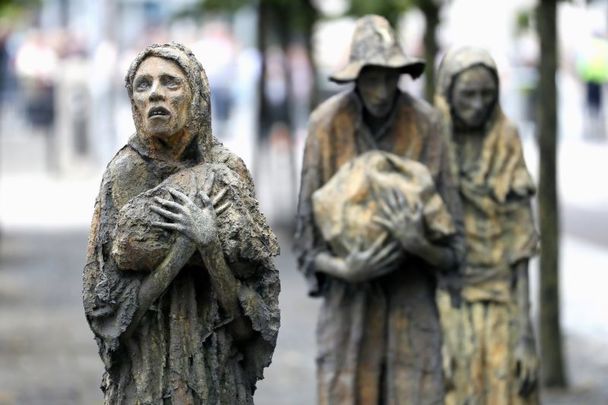Editor's Note: The below letter was shared with IrishCentral by signatory Dr John Cunningham of University of Galway today, Friday, March 15.
The Irish Famine of c. 1846-50 resonates through Irish and American history. During the Famine and in its aftermath, two million or more survivors emigrated to the United States, determined to make better lives for themselves. Many nursed a sense of the injustice that had brought starvation to their families and neighbours, and passed this to their children and to later generations.
Just last year, during his Irish visit, President Biden spoke to crowds in Dundalk and Ballina about the tragedy of the Famine and its impact on his own family.
As historians of the Irish Famine, we are conscious of the horrific effects of mass starvation, including the trauma it leaves in its wake. Alert to the threat of famine throughout the world in our own time, we are alarmed at its imminence in Gaza, and are strongly urging here that every possible step be taken to prevent it.
As a descendant of Great Famine survivors himself, and with the capacity to influence the situation, President Biden carries a particular responsibility, especially as evidence of impending calamity emerges on a daily basis.
The circumstances of Ibrahim-al-Kharabishy of Jabalia in Northern Gaza, “reduced to scavenging for cheeseweed and grasses to boil for his children," carry uncanny echoes of the Irish famine. According to the Financial Times, Ibrahim is one of 300,000 in the north of Gaza, who have faced “a descent into hunger and starvation that has been precipitous."
The family of Ramy Tarazi, sheltering in the Greek Orthodox Church of Saint Porphyrius, state that they rely mainly on bread made from barley and corn used for fodder. A kilogramme of Egyptian rice costs $28 (ten times the norm), putting it out of reach of almost all families in the region. There are many other such stories
Alex de Waal of Tufts University, a world authority on famine, sketches the probable course of developments: “Young children and the elderly will starve first. Then it will be women who save their last scraps of food to try to keep their children alive longer. Diseases like cholera will rampage through overcrowded camps…”
With ten children reliably reported last week to have died of starvation at the Kamal Adwan hospital, the process outlined by de Waal is already underway.
Hunger is everywhere in #Gaza 📍
The situation in the north is tragic, where aid via land is denied despite repeated calls. Ramadan is approaching. The death toll continues to rise.
Humanitarian access across the #GazaStrip & an immediate ceasefire are imperative to save lives. pic.twitter.com/mgdgxqDeJu
— UNRWA (@UNRWA) March 10, 2024
More than with most famines, this is an avoidable catastrophe. With its restrictions on the distribution of food aid, water, and medical supplies, Israel is manifestly causing famine as it wages war. In this, it is facilitated by the United States, which continues to arm Israel and give it political cover through the use of its veto at the UN Security Council.
In recent US announcements, there is a measure of recognition of the gravity of the situation in Gaza, but the practical measures which followed are inadequate. Air-drops will not stop famine; nor will the proposed maritime corridor between Cyprus and Gaza relieve starvation on the necessary scale.
On this St. Patrick’s Day in an election year, we are appealing to the conscience of Irish America. We ask Irish Americans in their capacity as citizens, as members of cultural and benevolent societies, as political leaders, to use their influence to avert a Famine as severe as the one faced by their ancestors. To do this it is necessary that the United States ceases arming Israel; that it puts pressure on Israel to halt its military action and lifts its blockade on Gaza; that it refrains from using its veto at the UN security council in relation to Palestine; that it restores funding to UNRWA, the agency best-equipped to provide relief; that it acts as an honest broker to bring about an agreed political settlement between Israel and Palestine.
- Dr John Cunningham, University of Galway
- Dr Emily Mark-Fitzgerald, University College Dublin
- Prof. Peter Gray, Queen’s University Belfast
- Dr Gerard Moran
- Dr Niall Ó Ciosáin, University of Galway
- Dr Cormac Ó Gráda, Emeritus Professor of Economics, University College Dublin
- Dr Ciarán Ó Murchadha
- Dr Andrew Newby, University of Jyväskylä, Finland




Comments